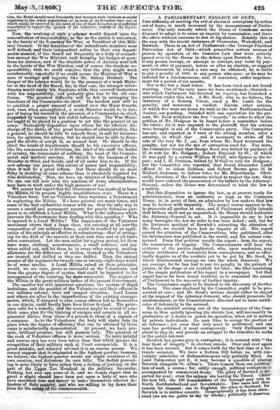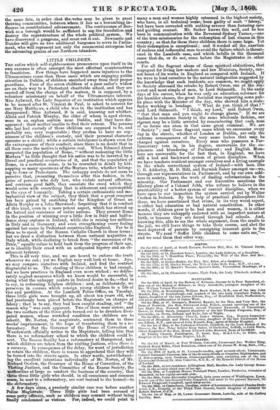A - PARLIAMENTARY NEGLECT OF DUTY.
Tun difiieultyof meeting the evil of electoral• corruption by action out of doors; is much increased by the inconsistency of Perlin- ment. The only remedy which- the Hansa of Commons seems disposed to adopt is to cause an inquiry by commission, and leave the affair without recourse to law ordegislation. Notably this is the case With the recent- instaneespf -Gloucester, 'Wakefield, and Berwick. There is an Act of Parliament—the Corrupt Practices Prevention Act of NU—which prescribes- certain courses of process by operation of the Common Law that were entirely passed over by the House in the debate upon Berwick. By law, if any person corrupt,. or attempt to corrupt, any rooter by pay- ment, or offer of payment, before or after an election, or suggest any inducement, -by which a vote may be obtained; he is liable to pay a penalty of 1001, to any person who• sues ; or fie may be indicted for a misdemeanour, and, if convicted, suffer imprison- ment tor- a period of six mouths.
Nor is the law a dead letter. It has been tried and sot found wanting. One of the very eases we have mentioned---Berwick- into which Parliament has directed an inquiry, has furnished a conviction under this Act. A Mr. Reed, who is; we believe, the Secretary of , a Reform Union, sued a Mr. Lamb for the penalty, and recovered a. verdict. Eleven other actions, of which five were set.down for trial at the last Northumberland Assizes, are-pending. Satisfied with one conviction for the pre- sent, Mr. Reed withdrew the five " records," in order to allow the petition of Mr. Hodgson to be heard before a oommittee before the-trials ; for it was imputed to the plaintiff, that his actions were brought in aid of the Conservative party. The Committee has sat, and reported in f your of the sitting member, after a scrutiny, in which they and it necessary to strike off the vote of the very Mr. I from whom Mr. Reed recovered the
penalty, but not for the act of corruption sued for. Nay more, the Committee found that George Keen was bribed by payment of 24 to vote for Mr. Hodgson ; Robert Blaylock by 61., of which 31. was paid by a certain William M.Gall, who figures in the re- port; and I. H. Pattison, bribed by M'Oall to vote for Hodgson ; but the Committee also reported, that David Alexander Lamb offered 61. to Adam Robison, and Robert Brown gave 31. to Michael Anderson, to induce votes for Mr. Majoribanks. Obvi- ously, therefore, if the Commons wished to respeot the law, they would have ordered the prosecution of the bribers by the Attorney- General, unless the House was determined to treat the law as s nullity.
But this disposition to ignore the law, as at present ready for 'administration, from an authority so high as the Commons House, is, in point of fact, an admission by law makers that law may be broken with impunity. The proper course appears to be, to-prosecute all parties at once, and it' Parliament really intends that bribery shall not go unpunished, the House should authorize the Attorney-General to act. It is impossible to say in how many boroughs the Act we refer to has been defied ; and, but for the fortunate accident of Berwiek's attracting the attention of Mr. Reed, we should have had no inquiry at all. His report roused the attention of the Conservatives-, who petitioned, after his information was published to the world, and his actions com- menced. From that petition results the report ; from the report, the commission of inquiry. The Commissioners will hear the evidence of the parties implicated, who, upon confession, may obtain certificates of indemnity from consequences, and so effec- tually deprive us of the verdicts yet to be got by Mr. Reed, to whose disinterested courage we owe the- whole cliscevery. We say courage, for he has had to pay Ms penalty in the pursuit of justice, in the shape of six verdicts for libel ; the libel consisting of the simple publication of his report in a newspaper. Yet that report has so far been found truthful, as to command the assent of Parliament to the necessity of further inquiry.
The Commission ought to be limited to the discovery of further bribery. The cases disclosed by the Committee ought to be pro- seeuted at once ; and Mr. Reed's actions should either be stayed at therequest of the Attorney-General, who should prosecute for misdemeanour, or the Commissioners directed not to issue certifi- cates of indemnity to the accused.
- But the mischief arising out of the inconsistency of the Com- mons in thus quietly ignoring the statute law, will neoesaarily be productive of a desire to quash its operation, when set in motion by private individuals. No man likes to occupy the position of an informer ; yet even that duty must be performed, and one man has performed it most courageously. Only Parliament is about' to step in, and provide an estoppel to the remedies he Seeks in the public interest.
Berwick has grown grey in corruption ; it is covered with " the hoer frost of iniquity ' in election annals. Over and over again it has been warned. But it comes forth for the last time at a for- tunate occasion. We have a Reform Bill before us, with con- venient schedules- of disfranchisement only partially filled. As Lord Paltherston put it, it may become a question of placing
Berwick alongside St. Alban's. There is more than one justifica- tion'of such, a course; for, oddly enough, political-corruption is accompanied by commercial.decay. The glory of Berwick is de- parted-for ever ; even the salmon are leaving the Tweed. Under' the new bill, the 1-0/. householders of the borough may vote in North Northumberland and Berwickshire. Two seats ivik,th9ofir remain for disposal : one to England, the other to Seotlanelf Berwick is in neither country. Geographically, it hasbeen ostra- cised (we are too polite to say by whom); politically it deserves the same fate, in order that the votes may be given to great thriving communities, between whom it lies as a benumbing in- finence on constitutional advancement.. The continuance of Ber- wick as, a borough would be sufficient to sap the foundation and destroy the superstructure of the whole political system. We have discovered a gangrene,, and must cut it out. Newcaatle and Dundee will give us two additional burgesses to serve in Parliar ment, who will represent not. only the commercial enterprise but the advancing genius ofpur Northern islanders.



























 Previous page
Previous page